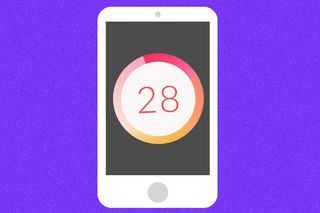
Period Tracking Apps Are a Contraceptive Gift to a Tech‑Savvy Woman… Or Are They?
Femtech designed its trackers with one fatal flaw.

Period tracking apps like Clue, Eve and Spot On are being marketed to women as the ultimate 21st-century birth control: They combine the most natural, hormone-free method available, with the power of smartphone technology to calculate your fertility day-by-day, so you can avoid unwanted pregnancies. What could go wrong?
Dot, for example, is currently the subject of an ongoing study into the efficacy of period tracking apps — as compared to ‘modern’ birth control methods, which range from condoms to IUDs, to hormonal pills and rings, to sterilization — at Georgetown University. While the study is not yet complete, so far it shows promising results. Researchers found that the app had a typical-use failure rate of 3.5%, which suggests Dot’s efficacy rate is on par with the Pill, injections, and hormonal rings. (Condoms and IUDs would be slightly more effective.)
The problem is in dissecting what “typical use” means. In the Georgetown study, which ultimately concluded Dot is an effective family planning tool, unplanned pregnancies did occur when participants used the app “incorrectly” (no pregnancies occurred in those cycles where the app was used correctly). The average of those behaviors is presumably what leads the researchers to a typical-use failure rate, i.e., the idea that birth control methods fail sometimes because people are not using them correctly.
But real women are discovering the hard way (i.e., through unwanted pregnancies) that there is no such thing as typical use of period tracking apps. A recent Guardian piece examined Natural Cycles, a Swedish period tracking app that recently garnered press attention after it became the first period tracking app to be certified by a government regulatory body as a contraceptive — a huge deal for the Femtech industry that depends on this type of legitimacy for its long-term success. The piece reflected on what an ideal user of Natural Cycles would look like:
“She’s in a stable relationship with a stable lifestyle. (Shift-workers, world-travellers, the sickly, the stressed, insomniacs and sluts be advised.) She’s about 29, and rarely experiences fevers or hangovers. She is savvy about fertility and committed to the effort required to track hers. I could add that her phone is never lost or broken and she’s never late to work. She wakes up at the same time every day, with a charged phone and a thermometer within reach.”
In other words, she doesn’t exist. How does that reflect “typical use”?
In order for femtech to truly address the needs of women, period tracking apps cannot be designed in a vacuum. They cannot be measured by the standard of a woman who pops out of bed every morning at 7am to measure her basal body temperature. They cannot ignore the fact that women with irregular periods — as many women with PCOS have — cannot successfully use them. If these apps are designed to work only when used ‘correctly,’ on an ongoing basis, in perpetuity, through messy lives and irregular schedules and wacky cycles, there is a fatal flaw in their design: there may be no such thing as a customer who can use them correctly.
Related


Should Parents Be Able to Tinker With the Genome of Babies Before They’re Born?
